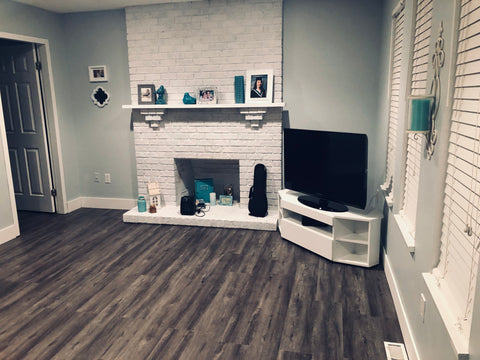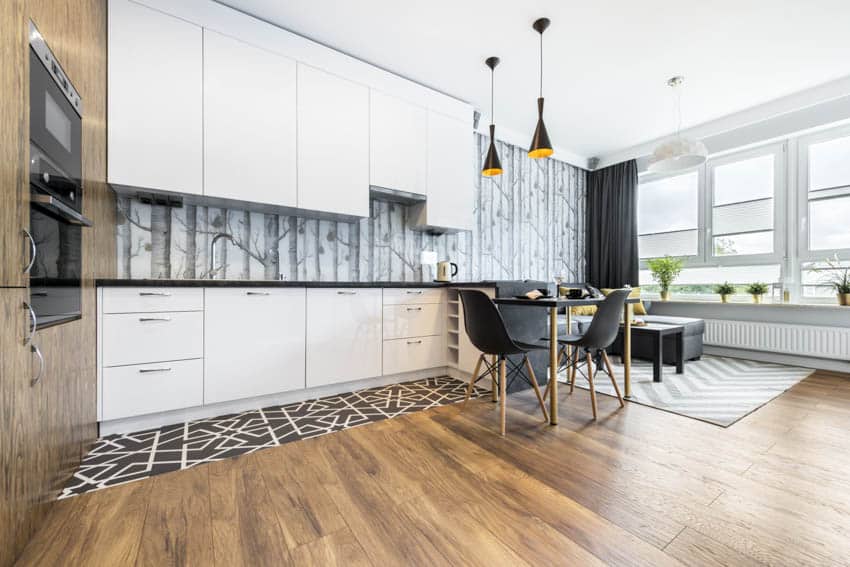There are different types of flooring that add up to the aesthetic of our homes. Flooring nowadays differs in design, texture, size, and material which has become a problem for some of our homeowners. Questions like: “Which among the flooring best suits my home?”, “How do they differ from each other?” are compelling in their minds. We’ll help you figure out these questions in this blog. The three most popular flooring options are engineered hardwood, laminate, and vinyl flooring, each with its own advantages and disadvantages. It can be overwhelming for first-timers who don't know much about the products to choose from the three flooring options. Let's discuss more about laminate, vinyl, and engineered hardwood flooring.
What is Laminate Flooring?

Laminate flooring was first manufactured in 1970 and it’s one of the first flooring made as a substitute for hardwood floors. It was made for homeowners who want a hardwood floor in their homes but don't have the budget for it. Who doesn’t want to have a cozy and modern-looking house made by the homey appearance of hardwood flooring? However, not all of us can afford authentic engineered hardwood flooring for our homes. Not until laminate flooring was introduced.
This flooring is made up of synthetic materials which appear like authentic hardwood. Laminate flooring has layers inside which are: the inner core, a decorative photo layer, and the wear layer (which acts as its protection). This flooring is comfortable on our feet and has a realistic wood appearance that can create a relaxing and attractive look for your house. With its realistic embossing, it has the appearance of wood, with some versions even looking like it has been hand-scraped. Laminate has a very attractive price point, and some versions (the lowest pricing) may need to be replaced within 10 years since not all of them are water-resistant or built to last. So in your shopping journey, explore the different specifications and various levels available in laminate. Some are extremely durable and water resistant, some are not. Of course, depending on how you take care of your flooring, it may last even longer. So if you have a little extra budget, consider a higher water-resistant floor with higher AC scratch resistant rating as an extra feature for durability.
With laminate flooring, you can definitely match the style of your house to your flooring by choosing from various designs available. Hundreds and hundreds of colour options are available in laminate. This is, indeed, great for homeowners who plan to have appealing flooring that could match the theme of their homes at an affordable price. Great for homes with pets and excellent option for rental homes that need extra durability. Great looking flooring but not heavy on the pocket.
What is Vinyl Flooring?

Have a project or environment that sees a higher risk of moisture? Well, water-resistant vinyl flooring may be the perfect one for you. Vinyl flooring can be made with multiple layers which makes it durable and water-resistant. This flooring usually has a solid vinyl core (or SPC or WPC core) layered with a printed vinyl image and a wear top layer. Many options available including click lock rigid core vinyl (WPC and SPC cores), loose lay and dryback vinyl options (usually glued down). Because of this, vinyl flooring can withstand a certain period of water exposure without causing any damage to it. Vinyl is water resistant which makes it appropriate for any room int he house. Ideally you don’t let the water sit on the floor for a very long time as water needs to go somewhere, and if it makes it way to the wall or the subfloor, it can cause damage. This flooring has different types such as Rigid Core vinyl flooring, WPC vinyl, and vinyl planks, so give your flooring store a call or continue your detailed research to find out the exact difference for each of these vinyl flooring options. We usually suggest getting some samples in hand, so you can touch and see the exact differences in these options.
What’s good about most vinyl flooring options is that they are DIY-friendly. This flooring has different ways of installation. Methods include peel-and-stick, click-and-lock, glue down, and loose lay. Although, we can introduce you to installers if you need installation services (using professionals is always a good idea) but if you are confident in your DIY skills and have done your homework on installation methods, vinyl is certainly a product for you.
Vinyl flooring is also very easy to maintain. You can clean it using a damp mop as well as scrub it using subtle cleaning products to remove stubborn dirt. This flooring is also durable and can last over decades. In the past, vinyl flooring has only a few designs available as options. But now, this has been improved with a lot of patterns and designs that could enhance the overall look of your home. Vinyl flooring is also more affordable compared to engineered wood flooring but this has a lot more admiring features that homeowners will love. Vinyl flooring is truly remarkable as it can add a modern and attractive surface to your home. This resembles not only wood but also ceramic floor and stone.
What is Engineered Hardwood Flooring?

We’re here down to our last type of flooring. Engineered hardwood flooring closely resembles real wood than laminate. Why? Because it is real hardwood!! The top veneer layer is really made up of real hardwood. This flooring has a thin layer (usually 0.6mm up to 4mm thick) of real hardwood material that has been bonded to a base core consisting of wood strips (think: plywood). Thus, engineered hardwood flooring is more stable and has other affordable options than solid hardwood. You can achieve a perfect-looking hardwood floor without spending too much on it. Engineered hardwood floors are also often wider than their solid hardwood cousin, so the looks achievable with engineered hardwood floors are fabulous.
As we said, this type of flooring has a real topmost layer of hardwood so it needs extra care for its maintenance. Mess such as water spills and leaks must be immediately clean to avoid damaging your beautiful flooring. You can apply floor wax to some specific types of engineered hardwood flooring to protect it from dirt and water but only do this if approved by the manufacturer's warranty. Hardwood is subject to dents and scratches. Keep this in mind if you have a home where this is a big risk, and then you may go back to considering laminate and vinyl options.
That said, engineered hardwood flooring can be fixed depending on the severity of the damage. Though, it’s still best to avoid damage to any flooring for them to last longer. This is definitely best for homeowners who prefer to have a real-looking hardwood that perfectly matches the style of their home. If you have the budget and enjoy natural wear and tear (which can add to the beauty of the floor over time) nothing beats engineered hardwood. It is nature. It is natural beauty what all other floors wish they were.
Which Type of Flooring is Best For Your Home?
The best type of flooring for your home will definitely depend on your personal preferences, budget, and activity. We have shown you the different characteristics of laminate flooring, engineered hardwood flooring, and vinyl flooring which you can use as a basis for your choice. Listed above are the attributes of each of the flooring materials so that you can make a better decision when choosing your flooring. If you choose to install any of the flooring materials discussed above, it is still advisable to seek professional assistance. Please give us or your flooring professional a call to find out more details or to get a sample in hand.
Other flooring blog articles you may want to read:
North Vancouver Huge Flooring Showroom Free Samples
